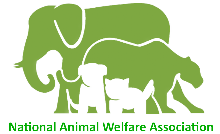- Another AZA whistle blower claims allegations of racism, animal welfare issues and a hostile work environment.
Published by -NAWA News Feed- in - AZA Incidents and News - · Friday 19 May 2023
Tags: Henry, Valis, Zoo, AZA, animal, care, University, of, Wisconsin, School, of, Veterinary, Medicine
Tags: Henry, Valis, Zoo, AZA, animal, care, University, of, Wisconsin, School, of, Veterinary, Medicine
At the end of June, the Henry Vilas Zoo's contract with the University of Wisconsin School of Veterinary Medicine will come to an end.



Recent news outlets doing investigations learned about the contract's termination while looking into fresh claims regarding animal care made by a former worker who quit the zoo in February, three months after a third-party inquiry into the zoo appeared to resolve earlier claimed difficulties.
He claimed that the long-standing partnership between the vet school and the zoo was inconsistent and allowed concerns about animal welfare to fall through the cracks.
The University of Wisconsin School of Veterinary Medicine and the Henry Vilas Zoo both deny many of the claims made by the former worker.
Because of the growing demand for its vets, UW informed the zoo in December that it would not be extending its contract, which was set to expire in June. It also mentioned in a statement that zoos the size of Henry Vilas normally employ their own internal veterinarian.

Whether the break had anything to do with earlier issues surrounding the zoo was not addressed by the institution.
Inquiry and controversy in the past
After months of unsuccessful contract discussions, the Henry Vilas Zoo and its zoological society, the group in charge of raising money and managing the zoo's concessions, finally split apart in 2019.
The separation was explained to Mark Romanoski as a chance for growth when he accepted a position as the zoo's lead veterinary technician the same year, according to Romanoski.
"The leadership who was present during the interview very much presented an image of, 'We just parted ways with our zoo society. We're definitely working to raise our bar," Romanoski said.
However, when he arrived, it wasn't what he had anticipated.
"When I entered the hospital on my first day, I thought, 'Oh, no. Romanoski asked, "What did I do?" They lacked, roughly speaking, 60% of the supplies and treatments.
The zoo encountered a lot of controversy while Romanoski worked there for over three years.
Former employees' claims of racism, poor animal welfare, and a hostile work environment were reported by the Wisconsin State Journal in 2022, drawing attention to the zoo.
The zoo was subject to inspections by three separate organizations as a result of the complaint.
Two citations regarding animal care were issued in May 2022 as a consequence of an inquiry by the US Department of Agriculture. The county and the Association of Zoos and Aquariums, the main zoo accreditation organization, both carried out their own investigations that fall.

Romanoski said, "I was so eager for change. "And not only short-term changes, but long-term ones as well, including action plans and action items, but there were none. And little we did receive was meager.
A retired Dane County circuit court judge conducted the county's third-party review, which discovered no additional animal care problems than those already mentioned by the USDA. A zoo representative noted that some minor animal display adjustments were made as a result of the AZA's review.
Romanoski, though, thinks they omitted some important details.
New claims about animal welfare
The majority of Romanoski's worries were caused by the contractual arrangement between the Henry Vilas Zoo and the School of Veterinary Medicine, as evidenced by the recent death of an animal and a health condition in another animal that was discovered by an outsider.
In order to cover the vacuum left by the 2019 retirement of the zoo's final full-time veterinarian, Dane County entered into a five-year contract veterinary relationship with UW. Currently, five UW veterinarians visit the zoo to provide veterinary treatment. According to the zoo, one of these vets handles about 80% of the on-site care, with the others filling in as needed. Additionally, a veterinarian is always on call in case of an emergency.
According to Romanoski, this system caused animals to receive uneven care and made it possible for health problems to go unnoticed.
Compared to when veterinarians are called in to treat huge animals owned by private individuals, he contends that the relationship made the veterinarians' visits to the zoo feel more like consultations than long-term care.
"They're not the primary vet, so once that case is resolved, that person is back on their own, and that was the way I felt like they treated the zoo, as just one of their rotations," the man said.
He claimed that UW veterans' roles were unclear, leaving the zoo with a staff that was constantly changing.
Every time a new vet arrived, it was as if "we had to kind of start from scratch," according to Romanoski. "In the end, the progress was very slow."
He thinks that in one case, the inconsistencies caused a skunk to pass away last summer from untreated congestive heart failure.
He said that at any given occasion, four separate vets had witnessed the skunk. She suffered congestive heart failure, which is what killed her, according to the necropsy at the UW. She therefore experienced untreated heart failure the entire time we worked her up.
In another, he said that it required a visiting outside veterinarian to spot a problem with a giraffe.
That person informed us that Eddie's stride, or the way he moves, is really unorthodox, Romanoski said. "If they had a vet who was appropriate, they would have had the vet pick that up on annual exams."
No particular complaints regarding animal care were addressed by the zoo, but it did issue a lengthy statement in which it claimed that "accusations about animal welfare concerns are especially hurtful to our team who have dedicated their lives to the well-being and conservation of the animals in our care."
Romanoski's departure
Romanoski claimed that when he brought up these issues with zoo management, he was punished and suspended for disobeying orders and fostering a hostile work environment.
He remarked, "It seemed like they were treating it as a threat.
Romanoski quit in February and detailed his issues in a lengthy exit interview that News 3 Now was able to get.

According to him, "[t]he UW veterinarians have no formal job description and the lack of oversight and accountability of the vets by the general curator and deputy director has led to constant stress within the hospital."
He continues by mentioning several particular instances of animal care as well as worries about how disputes between himself and zoo officials were handled.
The zoo claimed that Romanoski's suspension followed a string of verbal fights he had with UW veterans and other zoo employees.
A spokesman said in a statement that the former worker "was not interested in the collaborative work environment we foster here at Henry Vilas Zoo." "Unfortunately, we were unable to part ways amicably with this employee. Such splits frequently result in broken emotions and bruised egos.
Zoo authorities stand up for UW's vets
The zoo defended the facility's veterinary care, stating that "[o]ur zoo veterinarians are leaders in their field who are highly educated, compassionate, caring, proactive, and conscientious professionals."
Related AZA stories HERE.



